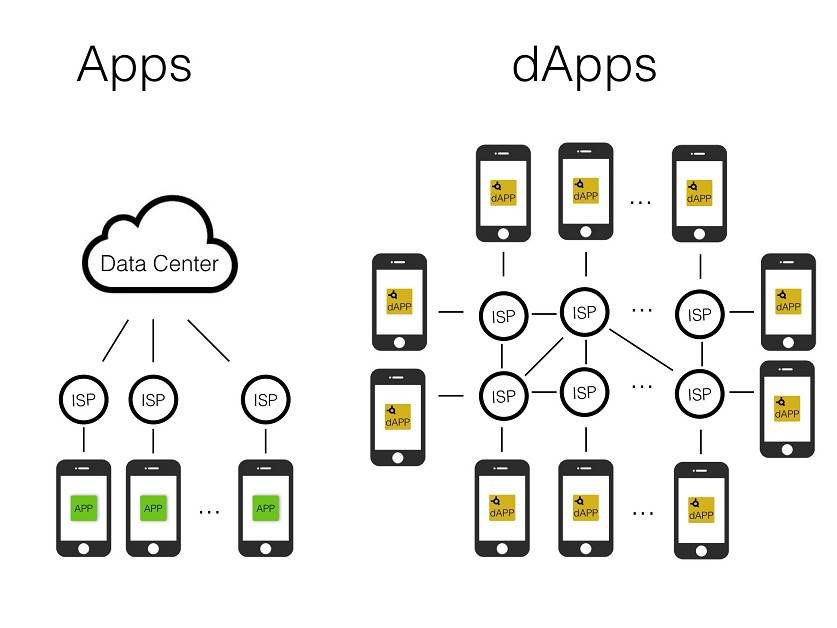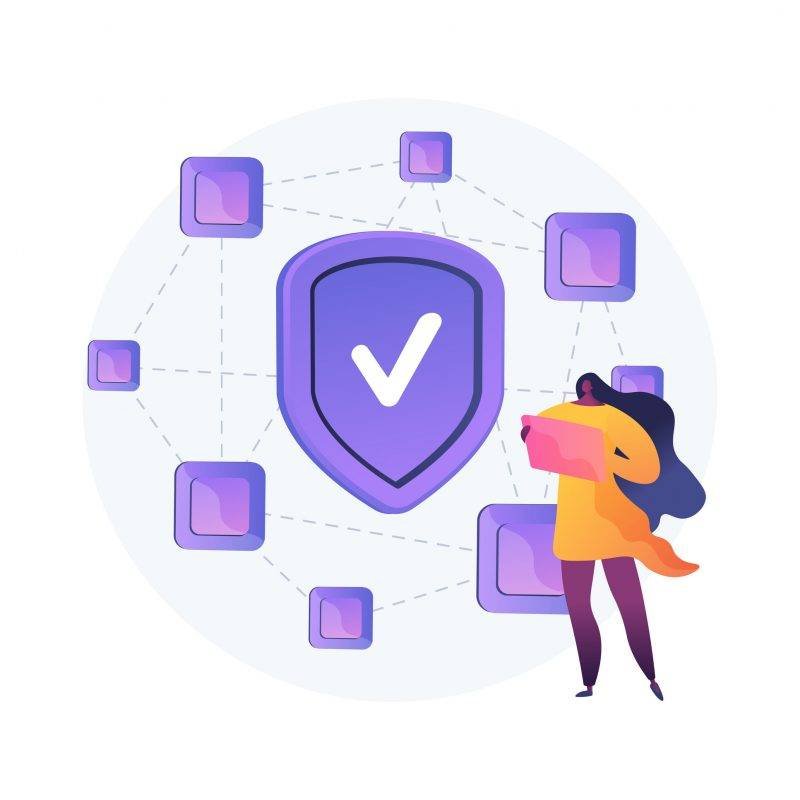Discover the benefits of DApps (decentralized applications) and learn why they are gaining popularity in the blockchain community. From increased security and transparency to reduced costs and the potential for new business models, find out how DApps can benefit both developers and users alike.
Decentralized applications, or dApps, are a new form of technology that has emerged with the advent of blockchain. dApps are designed to operate on a peer-to-peer network, without the need for centralized control, making them more secure, transparent, and cost-effective. In this article, we will discuss the benefits of dApps, their use cases, the potential for the future, and their limitations.
Did you know that the market for dApps is anticipated to generate $368.25 billion in revenue by 2027? The fast digitalization, adoption of blockchain technology, and expansion of dApps creation service platforms are all to blame for the continuous increase of dApps over the past several years. dApps lessen hazards and enable transactional activity in extremely secure settings. But why are dApps gaining such a following? Well, they lessen the dangers associated with data storage and protection while providing extremely secure transactions.
The demand for dApps development services platforms is also anticipated to rise in response to the growing need for secure and quick transactions, as well as the widespread use of dApps in eCommerce, transportation, gaming, and online trading. The numerous facets of dApps will be covered in this blog, along with the role development platforms are playing. So let’s jump right in!

Use Cases of dApps:
A. Finance
One of the most popular use cases for dApps is in the finance industry. dApps can be used for a range of financial services, including payments, lending, and insurance. By leveraging blockchain technology, dApps can provide greater security, transparency, and cost-effectiveness than traditional financial services.
B. Healthcare
dApps can also be used in the healthcare industry, for example, to store and share patient data securely and efficiently. By utilizing a distributed network, dApps can reduce the risk of data breaches and ensure that patients have control over their own health data. Additionally, dApps can be used to track the supply chain of pharmaceuticals, ensuring that they are genuine and safe for use.
C. Supply Chain
dApps can also be used to track the supply chain of goods, ensuring that they are produced ethically and sustainably. By using a distributed network, dApps can provide greater transparency and accountability in the supply chain, reducing the risk of fraud and abuse.
D. Gaming
dApps can also be used in the gaming industry, providing players with greater control over their in-game assets and reducing the risk of fraud and theft. By leveraging blockchain technology, dApps can create a more immersive and interactive gaming experience.
Potential for dApps:
A. Increased Efficiency
dApps have the potential to increase efficiency in a range of industries, by removing the need for intermediaries and streamlining processes. This can reduce costs and improve the speed and accuracy of transactions.
B. Disintermediation
dApps can also be used to disintermediate industries, by removing the need for middlemen and empowering users to transact directly with each other. This can create a more decentralized and democratic economy, with greater opportunities for small businesses and individuals.
C. Community Empowerment
dApps have the potential to empower communities, by providing them with greater control over their own data and assets. This can create more equitable and democratic systems, where communities have a greater say in how they are governed and how resources are allocated.
Limitations of dApps:
A. Limited Adoption
One of the main limitations of dApps is their limited adoption, as they are still a relatively new technology. This can create barriers to entry for users and limit the number of people who are able to use dApps effectively.
B. Complexity
dApps can also be complex and difficult to use, particularly for those who are not familiar with blockchain technology. This can create a steep learning curve for users, which may limit their adoption and use of dApps.
C. Scalability
dApps can also be limited in their scalability, particularly in terms of the number of transactions they can process. This can create delays and slow down the speed of transactions, which can limit the usefulness of dApps in certain industries.
Benefits of dApps
The advantages of dApps are numerous, and they include:
Decentralization
The main benefit of dApps is their decentralized nature. Traditional applications are owned and controlled by a single entity, which can make them vulnerable to censorship and data breaches. In contrast, dApps operate on a distributed network, where every user has equal control over the application. This ensures that there is no central point of failure, making dApps more resilient and resistant to censorship.
Security
dApps are inherently more secure than traditional applications due to their decentralized nature. In traditional apps, data is stored on a centralized server, making it vulnerable to hacking and data breaches. In contrast, dApps store data on a distributed network, where it is encrypted and spread across multiple nodes. This makes it more difficult for attackers to compromise the data, as they would have to hack into multiple nodes to gain access.
Transparency
dApps are designed to be transparent, with all transactions and data recorded on a public ledger. This makes it easy for users to verify the authenticity of transactions and ensure that they are not being manipulated or censored. Additionally, the open nature of dApps allows for greater accountability and trust, as all actions are visible to the community.
Immutability
The data recorded on a dApp’s blockchain is immutable, meaning that it cannot be altered or deleted. This ensures that once a transaction is recorded, it cannot be modified or deleted, making dApps more reliable and trustworthy.
Cost-Effective
dApps are often more cost-effective than traditional apps, as they operate on a peer-to-peer network, without the need for intermediaries or middlemen. This reduces transaction costs and makes it easier for users to exchange value directly, without the need for third-party services.
Resistance Against Censorship
The advantage is that no user can be prevented from using a dApp. No one or anything has the power to take over the network, install apps, stop users from making transactions, or access data from the blockchain. In other words, there is no one to prohibit you from posting anything you want on social media.
Anonymity
Most dApps don’t demand that you divulge your identity. All you need is an Ethereum login and digital wallet to avoid filling out lengthy forms.
0% downtime
The dApp system will function even if certain components of the network architecture are offline. After the platform becomes online, your app will continue to operate normally and will only crash if the blockchain platform itself crashes.
Data Reliability
With cryptography, hackers cannot counterfeit the data that is saved. Users can also check transactions on the public blockchain by accessing it. Data records will become more trustworthy as a result, and information transmission will become smooth.
Integrated Payments
You won’t need to keep in touch with your vendor or integrate your apps with other platforms while using dApps. This will speed up the processing of payments even further.
dApps’ potential use cases
There are countless application cases for these technological marvels with a wide variety of dApps. The crypto blockchain industry is undergoing a change as a result of developers’ nonstop effort and new use case development. The following are some use cases you should be aware of:
Investment in cryptocurrencies: Cryptocurrencies have the potential to decentralize money and address major global economic issues. Applications like Chainlink are working hard to connect smart contracts with information from the real world.
Property registrations: dApps will succeed in eliminating middlemen from the real estate industry and providing users with a seamless experience.
These gaming platforms are the newest craze in the industry. Users have the opportunity to make real money and are free to utilize it for a set period of time. One such game is Splinterlands.
Collectibles: In the near future, these dApps will also experience a boom. A growing number of blockchain companies are interested in producing collectible DApps like crypto cats.
Conclusion:
In conclusion, dApps are a promising new technology that has the potential to revolutionize a range of industries. Their decentralized nature provides greater security, transparency, and cost-effectiveness, while their potential for disintermediation and community empowerment creates more democratic and equitable systems. However, there are also limitations to dApps, including their limited adoption, complexity, and scalability. Overall, the future of dApps looks bright, with potential for continued growth and development in the coming years.


